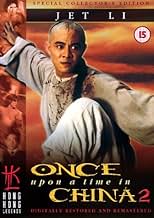When we last saw Wong Fei Hung (Jet Li), he emerged as a hero to his people in fighting against the invading foreign forces that were wreaking havoc in his hometown. By part 1's conclusion, he has also come to realize that his country is going through inevitable changes and that acceptance to western cultures is the best possible answer to the dilemmas.
Like Wong's change in view, part II shifts from its predecessor's themes of nationalism and self-strengthening to an exploration of cultural and ideological tolerance. With all that said, Once upon a time in China II is one of those rare sequels that manages to cast a shadow over its original and brings the franchise to a new height.
Li once again delivers a towering performance reprising his role as Wong. Although there's very little development to the character since the last time we met him, we are immediately won over the second he raises his first kick to the sound of the beautifully familiar score. Accompanied by Aunt 13 (Rosamund Kwan) and his mischievous student Leung Foon (Max Mok replacing Yuen Biu of the original), the trio travels to Canton only to find a town ravaged by chaos and violence. Instead of foreigners being the chief baddie this time, the White Lotus Sect and its zealous leader priest Kung (played wonderfully by Xiong Xin Xin) takes over as the story's primary antagonists. First introduced by a breathtaking prologue, they are portrayed as a fanatical cult bent on eradicating all foreigners and those that follow foreign ways, even going as far as murdering little children.
One of the film's most refreshing features, however, was the inclusion of a complex villain in the form of Donnie Yen's Charismatic Manchu military commander/imperial guard General Lan. Despite being pitted against our heroes, he is a man that is hard for the audience to despise when he's telling his men not to hurt civilians or having a brief heart to heart with Wong on their country's chaotic state.
Once upon a Time in China II is without a doubt the pinnacle of the series and quite possibly the career peak of everyone involved especially for one Tsui Hark. After this, it is the slow decline for the former new wave auteur who would attempt to dip his hands into mainstream Hollywood (only to stink up his CV with Double Team and Knock Off) before taking a stab at the recent trend of big budget wuxia epic only to come up with the woeful Seven Swords. If any of you were unfortunate enough to have seen those movies I've just mentioned, I can guarantee that Once upon a Time in China 2 is the perfect antidote for you.

























